Inside Indonesia’s 21st century version of England’s ‘dark satanic mills’
It’s the place EV buyers don’t see. An Indonesian fishing village transformed into an industrial epicentre designed to underpin the world’s electric vehicle sector. The reality is ‘a mess’.
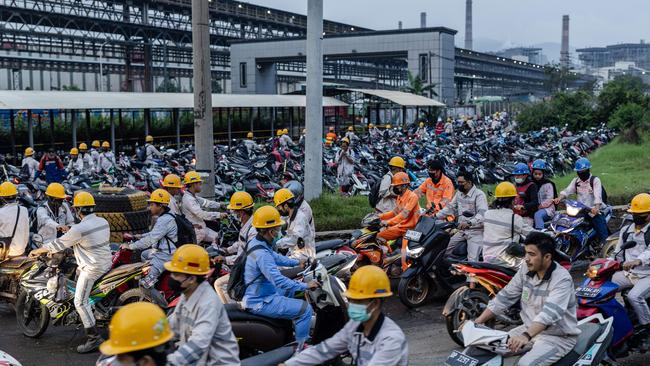
There is only one road in and one road out of Morowali and every day at least 100,000 workers must use it to reach the world’s largest single nickel industrial park – Indonesia’s 21st century version of England’s “dark satanic mills”.
What was once a sleepy tropical fishing village in Central Sulawesi is now a town trapped inside a massive mining industry that is spreading outward and subsuming all in its path. Giant coal mounds sit behind shops and boarding houses on one side of the potholed, dusty road, scarred mine pits, smelters, power plants and belching chimney stacks on the other – a bleak landscape that evokes poet William Blake’s description of England’s nature-obliterating early Industrial Revolution.
Overhead conveyor belts transport millions of tonnes of coal to power an energy-intense industry Indonesia hopes will form the backbone of the world’s green electric vehicle sector.
“It’s the biggest mess. It’s just sad and horrible,” one veteran Indonesia-based mining expert told The Australian.
“They built this industrial park with dozens of smelters in the middle of a town that just happens to be located in one of the most active seismic areas in the world.”
Indonesia accounted for 55 per cent of all global nickel exports last year thanks to an explosion of largely Chinese investment in the local sector triggered by an initial 2014 government ban on the export of raw nickel ore that was made permanent in 2020. China’s president Xi Jinping attended its 2013 inauguration.
The idea was to force Indonesia’s raw commodity buyers to help develop a more valuable downstream industry, and it worked.
The country’s nickel exports have surged from $US6bn in 2013 to more than $US30bn in 2022 on the back of what the government says is $US29bn in foreign investment, a large part of that from China’s Tshingshan Holding company – the world’s largest stainless steel producer.
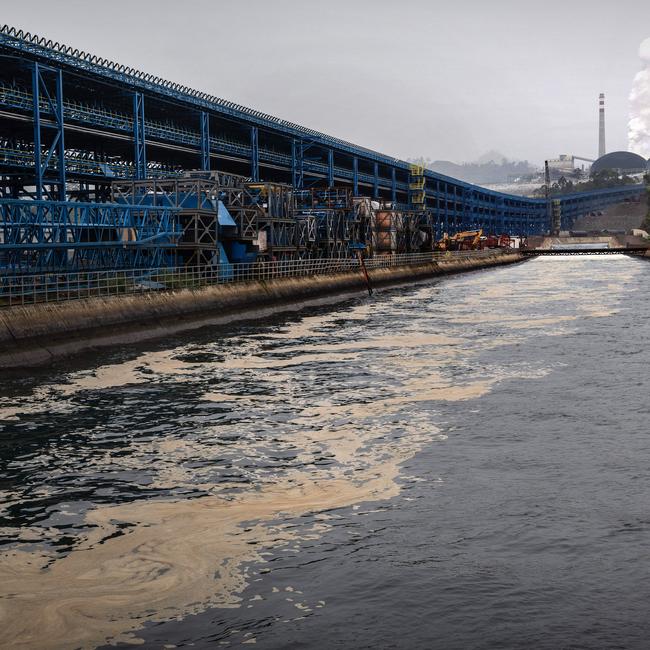
But in the process it has flooded global markets, driven prices down by half in the past year and forced the closure of Australian nickel mines that cannot compete with a product made from cheap labour and low environmental standards. Smelters, mines and industrial parks have sprouted across Sulawesi and on the famed spice island of North Maluku, displacing populations, clearing tropical forest, polluting waterways and destroying traditional livelihoods, numerous recent studies have claimed.
Dazzled by Beijing’s Belt and Road billions, critics say, Indonesia has ended up with a nickel industry dominated by Chinese companies that have scant respect for the environment and labour standards.
“China provides easy money … investments without environmental and good governance requirements, without having to pay attention to human rights,” says Muhammad Habib Dzakwan, a researcher at Jakarta’s Centre for Strategic and International Studies.
“China is always there, always providing comfort to Indonesian officials. That’s why we don’t change.”
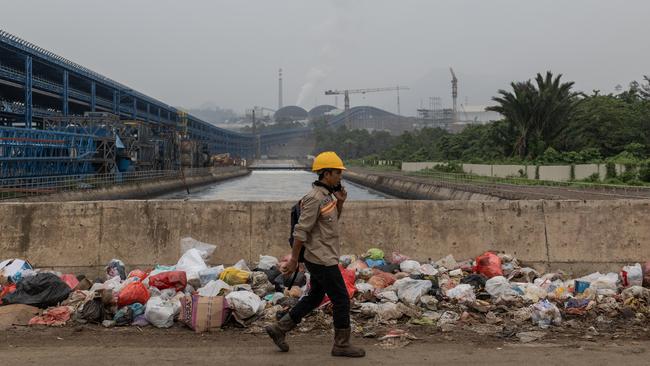
When it rains, Morowali’s coastal waters turn black from coal soot, the rivers red from waste tinted with oxidised iron that runs off the poorly-maintained mines, locals say.
All year round, workers and their families present at Morowali’s main community health centre with respiratory diseases, skin and eye complaints linked to the sulfuric acid used in battery-grade nickel processing, and the thick coal dust that blankets the town.
“It should be that if they want to create green cars they have to make sure the product doesn’t create environmental damage. They should ensure worker safety and welfare too, but that’s not what’s happening,” Rudin, chairman of the Morowali Industrial Workers Union and a nickel smelter worker, told The Australian.
“All of us came here to make a living for our families, but in the process we are bargaining with our lives.”
Last Christmas Eve, 21 workers were killed and 53 injured in the worst workplace accident yet to occur inside the Chinese-funded and managed Indonesian Morowali Industrial Park, known locally as IMIP.
Rudin says it happened because the managers of the Indonesia Tsingshan Stainless Steel factory, a subsidiary of Indonesia’s largest nickel investor and park manager, refused to allow a malfunctioning furnace to be shut down and cooled before it was fixed.
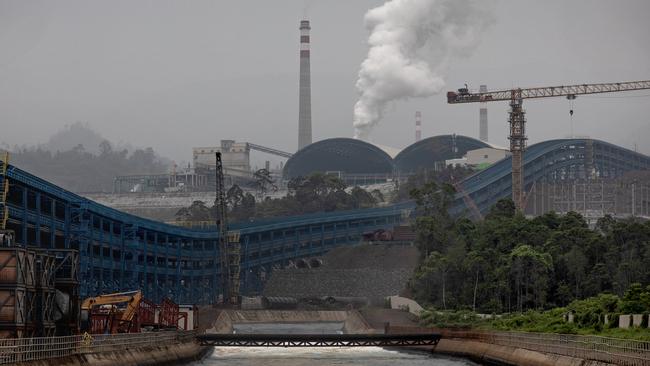
Six days later, a nickel mine excavation landslide within IMIP killed two more workers, taking the number of fatal accidents at nickel processing facilities for the year to more than 20.
The government has demanded Tsingshan improve its safety record though a provincial official in the Manpower and Transmigration Office told Bloomberg this month that it struggled to gain access to the park and that “supervision in the smelter industry, especially at ITSS, is not optimal”.
“Incidents happen all the time there but most are not exposed because workers worry that if they report them they will be sanctioned or their wages cut,” says Rudin. He also said that many workers already struggled to meet the high cost of living in Morowali on an average salary of $650 a month.
Neither IMIP nor Tsingshan responded to questions put to them by The Australian.
IMIP workers are subjected to a disciplinary system – much like Beijing’s pernicious social credit system – in which points deducted for even the most minor infringements can result in cuts to workers’ wage entitlements, or dismissal.
“You know in China how there’s a social point system? That happens here too,” Rudin says.
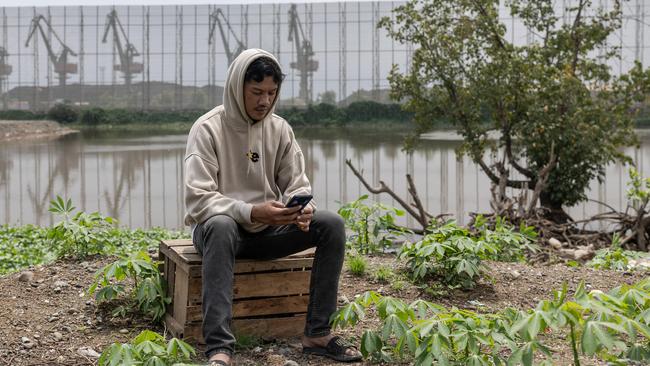
Election issue
If Indonesian Defence Minister Prabowo Subianto cruises to victory in the country’s presidential elections that are being held on Wednesday – as the latest opinion polls suggest he may – it will be on the slipstream of outgoing president Joko Widodo’s development agenda which counts the runaway expansion of the country’s nickel industry among its crowning achievements.
Indonesia and Australia have the world’s largest resources of nickel, a key product in many rechargeable batteries for electric vehicles, smart phones and laptops. But it is Indonesia that is dominating the industry.
To Jokowi and his would-be successor Prabowo – a two-time presidential election loser who has pledged to continue his former political rival’s infrastructure legacy – the nickel downstreaming policy has shown a pathway out of the dreaded middle-income trap.
For many ordinary Indonesians who are now counting the cost of those ambitions, however, Wednesday’s election offers little chance of relief.
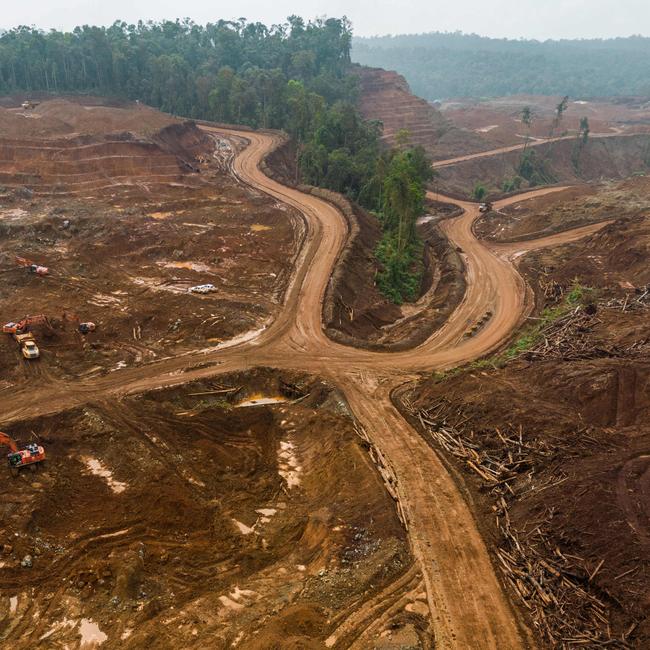
There are few votes to be gained in swimming against resource nationalism in a country which suffered centuries of plunder under Dutch colonialism.
In a foreign policy speech last November, Prabowo warned a roomful of diplomats that Indonesia would not be lectured to over environmental practices and did “not want to be a nation of coolies”.
His two rivals – former central Java governor Ganjar Pranowo and former Jakarta governor Anies Baswedan – have also signed on to Jokowi’s down streaming program, although Anies has told The Australian he would strengthen environmental oversight and worker safety.
His team triggered a fierce election debate after pointing out some EV manufacturers were moving away from nickel-based batteries towards cheaper, less emissions-intense Lithium Ferro-Phosphate batteries, and that most of the profits from Indonesia’s sector have gone to Chinese investors who have formed a smelter cartel.
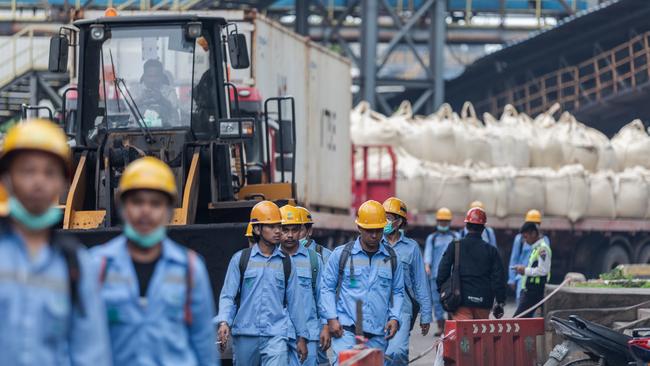
Senior Indonesian economist Faisal Basri says Chinese companies reap 90 per cent of the profit from Indonesia’s downstreaming policy which – rather than developing Indonesia’s economy – “actually supports China’s industrialisation”.
Jokowi’s former deputy chief of staff, Yanuar Nugroho, insists downstreaming makes sense for Indonesia, which should be selling end products rather than raw commodities.
But that process should not come at the expense of workers or the environment, he cautions, pointing to the fact that the Morowali industrial park was originally intended to host four companies but was now accommodating 40.
“From the beginning until today, accidents happen there nearly every week but we can’t force public transparency in monitoring and evaluation because of its ‘vital project’ status,” he told The Australian.
“What we need to do is build our capacity for industrialisation.”
The candidates’ consensus gives little comfort to traditional fishermen such as Nanang, whose village of stilted houses built over Banda Sea mangroves now lies in the shadow of a massive coal plant that powers the Morowali Industrial Park.
The 39-year-old father of three struggles to make a living from local waters polluted by hot outflows from the nearby plant, and nickel barges which have destroyed the coral.
He must travel miles out from his former fishing grounds to find catch and is angry at the government for not imposing stricter regulations on the nickel industry.
“Before this park you could just fish from around here – the water was clear – but I can’t do that anymore,” Nanang said.
“Now it’s hard to make a living. I’m very concerned about my family’s health because when the wind blows this way you can feel the coal dust coming over you. But if we moved the company wins,” he added bitterly.
“Actually, this place is not liveable anymore with all the pollution, and the kids have respiratory issues. But we won’t move without compensation.”
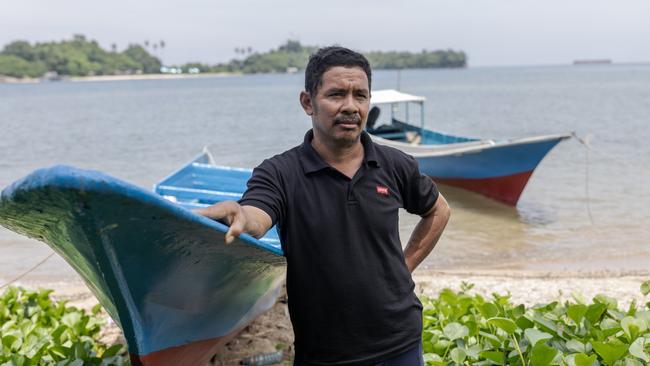
Spice farmer Sarahuddin claims he is still awaiting compensation for several hectares of plantation land he lost to an expansion of Australian company Nickel Industries’ Morowali operations several years ago.
He now relies on income from a worker boarding house built on family land in Labota village, which is steadily being swallowed by IMIP.
“After the election is over I want to go to the central government and ask for justice,” the 40-year-old told The Australian.
But he won’t bother voting.
“My time is better spent on my nutmeg trees because none of those leaders care about the small people,” he said. “The government ignores our concerns. None of their policies trickle down to us.”
Australia, the US and the European Union have all railed against Jokowi’s export ban which they say has distorted the global market, a finding the World Trade Organisation upheld in 2022 but which Indonesia is in the process of appealing.
Last month, Andrew Forrest’s Wyloo Metals shuttered three West Australian nickel mines that had been bought less than a year ago because they could no longer compete with cheap Indonesian nickel.
BHP has since partly closed its Kambalda nickel ore processing plant and is said to be weighing up the future of its flagship Nickel West mine.
Sam Riggall, managing director of Australia’s Sunrise Energy Metals which is developing its own nickel operations in NSW, says China has “killed the nickel market very quickly by expanding supply so rapidly”.
“It’s a replay of what you see in many commodities markets and especially rare earths. China expands supply to push out all other production options.
“I don’t call it an Indonesian nickel industry. It is China’s nickel industry plonked in Indonesia.”
Within days of Wyloo’s announcement, Deputy Trade Minister Tim Ayres was in Jakarta telling reporters Australia hoped to work with Indonesia on building its environment social and governance (ESG) capabilities in nickel. “That is what customers around the world will be demanding in terms of exports,” he said.
Resources Minister Madeleine King told an industry roundtable in Perth that same week the federal government was pushing for agreed international ESG standards that recognise nickel produced to higher standards.
“If the world is really serious about helping the planet, we need to ensure all materials we mine and manufacture are as green and clean as they can be,” she said.
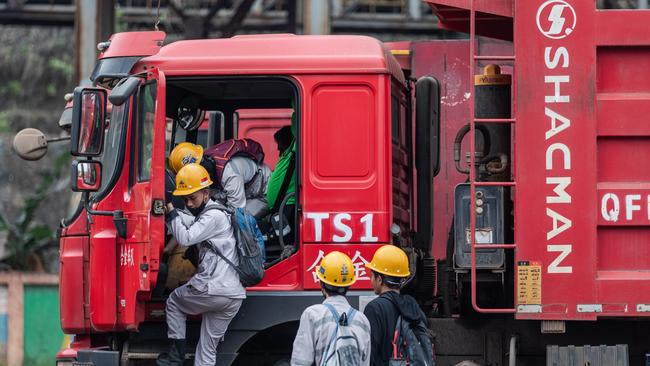
Consumer demand
Wealthy and environmentally conscious consumers worldwide are embracing electric vehicles as a way to help reduce global carbon emissions.
EV sales in Australia have been doubling each year, and now account for almost 8 per cent of new car sales. More than 80,000 EVs were sold last year, up from 33,000 in 2022, according to the Federal Chamber of Automotive Industries. Full electric vehicles and hybrid models accounted for a quarter of new vehicles bought in China last year, while 18 per cent of new cars registered in 2021 across Europe were electric or hybrid, and at least 5 per cent in the US in the first half of 2022.
Despite its dominance of the global nickel market, Indonesia has struggled to entice investment from many of the world’s largest electric vehicle manufacturers, which are under pressure to reduce the emissions intensity of the raw materials used in the manufacturing process.
Last month, yet another international report into Indonesian nickel practices, this time from US-based Climate Rights International, claimed the China-funded nickel Weda Bay industrial complex in Maluku province was causing sweeping environmental damage and degrading indigenous rights.
It urged the world’s largest EV carmakers such as Tesla, Ford and Volkswagen “to take steps to ensure nickel used in their electric vehicles is not driving human rights and environmental abuses”.
But as Indonesia’s global dominance of the nickel market grows, resistance is weakening.
Battery materials provider BASF is moving into the market, as is Hyundai.
Ford has also signed a deal with Vale Indonesia, a Brazilian joint venture which has begun the switch to more renewable energy sources at its southeast Sulawesi operations to reduce the emissions intensity of its nickel processing.
Meanwhile, Chinese battery giant CATL and EV manufacturer BYD have both announced massive new investments.
Many Western nickel miners and processors have stayed away from the Chinese-dominated sector, but ASX-listed Nickel Industries is now Australia’s biggest investor in Indonesia with more than 6000 staff and a total investment of $US2bn.
Its majority-owned Hengjaya Mineralindo mine camp, 15km outside of the Morowali industrial park, looks like any Australian mining operation with neatly-graded roads and well-constructed worker dorms.
For years it has produced nickel pig iron for stainless steel and nickel matte through its collaboration with Tsingshan at the IMIP facility but is now also moving into high-grade nickel production suitable for rechargeable batteries.

Chief operating officer Tony Green says its near-6000 hectare mine is producing record volumes of nickel thanks to an investment in a High Pressure Acid Leaching plant in Morowali which uses sulfuric acid under intense heat and pressure to convert nickel laterite – a low-grade ore found just under the top soil – into battery-grade nickel.
The process is less carbon-intensive than that used to produce nickel pig iron – also a precursor for batteries – but creates mountains of waste that must then be stored in one of the world’s most seismically active regions, known for heavy rainfall and landslides.
Mr Green says Nickel Industries has worked hard to improve its ESG standards – including through a planned switch to electric mine vehicles and solar power for an HPAL plant currently under construction – and believes they are starting to influence others.
“We’ve had other mining companies come and look at the way we do things –_ our safety and environmental plan,” he says.
“I think we set a good example, and if that means we’re going to make more money than West Australian miners then that’s great. We’re an Australian company and we have Australian shareholders.”
Still, the company is clearly sensitive over the spotlight cast on damaging practices at the Morowali plant and Maluku’s Weda Bay industrial park, where it also has operations.
Chief executive Justin Werner says Nickel Industries has been unfairly tarnished by the poor practices of some companies within the parks but insists the Indonesian government is cracking down on the worst offenders.
“The number of initiatives we’ve made towards reducing our carbon intensity is the reason we’re getting interest from battery makers. We are going to be one of the lowest carbon emitters globally,” he said.
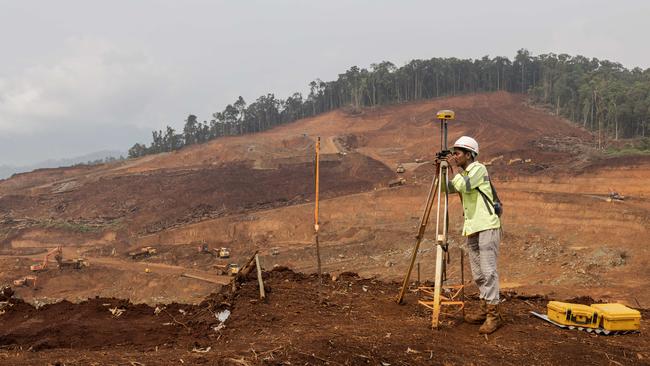
It is a sales pitch the company is rolling out to the world’s biggest international battery and EV manufacturers which, Mr Werner insists, need nickel “at a scale that is not available anywhere else”.
Its success may hinge on how its collaborations with Chinese nickel majors such as Tsingshan are viewed, given the US Inflation Reduction Act rules out EV subsidies for any manufacturer sourcing materials from “foreign entities of concern”, such as China.
Either way, insists Sam Riggall, Morowali is an “unsustainable business model” once the environmental risks and community issues are taken into account.
“The biggest problem for Indonesia’s nickel sector is you’re putting a very aggressive industrial process into pristine archipelagic islands that just are not built for it, and communities are suffering terribly,” he says.
Consumers who care enough about the environment to invest in electric cars should be “voting with their feet and their wallets” and avoiding batteries that contain high-carbon intensity Indonesian nickel.
“But at the moment no one really cares where the metal comes from as long as they get their electric car,” he says.
“No one seems to care how the sandwich is being made as long as it makes them feel better.”
ADDITIONAL REPORTING: DIAN SEPTIARI






To join the conversation, please log in. Don't have an account? Register
Join the conversation, you are commenting as Logout